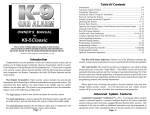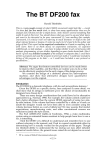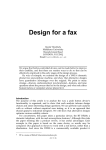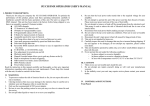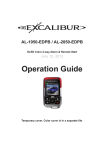Download Omega Vehicle Security K9-6ATV2 User's Manual
Transcript
Table Of Contents OWNER'S MANUAL for K9-6ATV2 One or more of these patents may apply to this product: #5,612,578 #5,612,699 #5,654,688 #5,663,704 #382,558 #385,878 #5,719,551 #5,729,191 #5,739,748 #5,750,942 #5,818,329 #5,739,747 COPYRIGHT: OMEGA RESEARCH & DEVELOPMENT, INC. 1999 Introduction Congratulations on your purchase of your new vehicle security system and on joining over 8 million people worldwide who have trusted their vehicle's security to the designers of Omega Research & Development, Inc. To learn how to operate your security system, please become familiar with the following three principal user components: the Remote Transmitter, the Red LED Status Indicator and the Valet Switch. The Remote Transmitter: Each security system includes two pre-learned transmitters, but if desired up to 4 different transmitters can operate the system. The transmitter has three buttons: one large button in the middle and two smaller buttons, one on either side. This system is pre-programmed to have the transmitter buttons work in the following configuration: The large button is used to arm, disarm and panic the security system. The small right button is used to operate the 2nd channel output, typically used for trunk release, and arm and disarm the system without the audible chirps. The small left button operates the 3rd channel output and, in conjunction with the large button, can remotely bypass a sensor upon arming. Page - 3 Introduction ...................................................................................................... 3-4 Advanced System Features ............................................................................... 4-5 Transmitter Operations ........................................................................................ 6 Arming the System Using the Transmitter ....................................................... 7-8 Passively Arming the System ........................................................................... 8-9 Security System Armed and Triggered ........................................................... 9-11 Disarming the System ................................................................................... 11-12 Remote Panic Feature ........................................................................................ 13 Optional 2nd Channel Output (Trunk Release) and 3rd Channel Output .... 13-14 Using the Valet Switch ................................................................................. 14-16 Red LED Status Indicator ............................................................................. 16-18 Audible and Visual Indications ........................................................... 18-19 & 22 Auxiliary Optional Sensor Port with Prewarn .............................................. 22-23 Anti-Carjacking Protection ........................................................................... 23-24 Optional Pager Unit and Backup Battery .......................................................... 25 Programming Transmitters ........................................................................... 25-26 Programming Features .................................................................................. 27-29 Features Programming Checklist .......................................................... Centerfold Programmable Features ................................................................................ 29-38 Transmitter Options ........................................................................................... 39 The Red LED Status Indicator: Informs you of the different conditions the security system can be in and also serves as a visual deterrent to break-ins and theft. The Valet Switch: This switch is used for several purposes, one which is being used to place the system into "Valet Mode". Valet Mode can be used to turn off automatic functions, such as Last Door Arming or Automatic Rearming. The Valet Switch is also used, with the ignition key, to disarm the security system in the event the transmitter becomes inoperable, and this switch is also used in the procedure for programming features and learning transmitters. Please spend time reviewing this guide to become familiar with your new Omega vehicle security system. You will find that your new vehicle security system will give you years of trouble-free convenience and protection. Advanced System Features Automatic Transmitter VerificationTM (ATV): Your Omega vehicle security system is protected against a common weakness found in all remote controlled security systems, and even factory-equipped Remote Keyless Entry systems. This weakness is the ease in which an additional transmitter may be programmed to operate the system. This vulnerability allows a thief to code his own, unauthorized Page - 4 transmitter to operate your system for the purpose of stealing your vehicle or its contents. For the first 48 hours after any transmitter is encoded to operate the system, every time the ignition switch is turned "on", the siren will chirp rapidly for two seconds, and the LED Status Light will flash for 90 seconds. Additionally, in normal operation, every time the ignition switch is turned "on", the LED Status Indicator will flash and pause for ten seconds, the number of flashes between each pause being equal to the number of transmitters encoded to operate your system. For example: two flashes and a pause indicate that only two transmitters are coded to operate your system. In the event the system alerts you to a recent transmitter addition, you can now immediately reprogram your transmitters, effectively erasing any unauthorized transmitters. TM Transmitter Code Jumping : The transmitter sends a digitally coded signal to the security system. The transmitter and security system will advance to another code to use for the transmission. With each use, this digital signal changes. This Code JumpingTM feature prevents a thief from using a "code grabber" device to record and play back a transmission for the purpose of disarming your vehicle security system. Page - 5 Arming The System Using The Transmitter Arming The Security System Using The Transmitter: The security system can always be armed from the transmitter provided the ignition key is “off” and the system is disarmed and not in the Valet Mode. To arm the system, after you exit the vehicle and close all of the doors, simply press and release the large transmitter button once. Instantly the parking lights will flash once, the siren will chirp once and the LED Status Indicator will begin to flash confirming that the system is armed. Further, the doors will lock and the starter interrupt relay will engage to prevent any attempt to start the vehicle. Your security system is now fully armed, and is ready to respond if an intrusion attempt is detected. Arming Bypass: Upon arming, if any sensing circuit is inoperable, that circuit will be bypassed. For example, if the trunk is left open, you can still arm the system with the transmitter. The bypassed circuit will automatically be reinstated for protection 5 seconds after the circuit becomes operative, i.e., when the trunk is closed. When a triggered circuit is in a bypassed state, all other operating circuits will be protected normally. Sensor By-Pass: Your security system provides you with the convenience of temporarily deactivating any optional auxiliary sensor without affecting other Page - 7 Transmitter Operations Also see pages 26 and 38-39 Small Left Transmitter Button- Pressing the small left transmitter button for 2.5 seconds activates the 3rd channel output, which may be used to operate optional devices. If an optional auxiliary sensor is part of the system, pressing this button within 4 seconds after arming the system will turn the sensor off. K 9 LED Light- Illuminates when a button is pressed. Small Right Transmitter Button- If this button is held for 3 seconds, the security system will activate the 2nd channel output (typically used for trunk release). If this button is pressed twice, the system will arm or disarm without audible chirps. Large Transmitter ButtonPressing and releasing this button will arm and disarm the security system. If the optional doorlock interface is installed, the doors will lock upon arming, and unlock upon disarming (however, if the system is in a triggered condition, disarming will not unlock the doors). If you have the optional unlock driver's door feature, then upon disarming only the driver's door will unlock, and if the large button is pressed again within 4 seconds, all of the doors will unlock. Pressing and holding this button for 3 seconds will "Panic" the system- which will sound the siren or horn, flash the exterior and interior lights and also lock the doors. Page - 6 trigger circuits. To deactivate the sensor, simply press and release the small left transmitter button within 4 seconds after pressing the large transmitter button when arming the system. You will hear a second siren chirp confirming that the security system has armed without the sensor protecting the vehicle. The next time you arm the security system, the system will reset to its normal condition, and the sensor will again be part of your protection. Passively Arming The System Passively Arming The Security System Using Last Door Arming: You can also pre-select your security system to automatically arm and lock the doors when the vehicle's last door is closed. The moment the last door closes the siren (or horn, if used) will chirp once, the parking lights will flash once and the LED Status Indicator will begin to flash rapidly. Thirty seconds later the siren will chirp again, the doors will lock (provided that the Passive Lock feature has been chosen) and the LED Status Indicator will slow to a steady flash, confirming that the security system is fully armed. If a point of entry is reopened before the single siren chirp at 30 seconds, the passive arming process stops and will reset to start over when the point of entry is re-closed. Automatic Last Door Arming offers a high level of security, since you do not have to remember to arm the security system every time you leave the vehicle. Page - 8 Additionally, Automatic Last Door Arming may entitle you to an insurance discount. Please note that the previously mentioned Arming By-Pass feature does not operate with the Automatic Last Door Arming feature. The bypass feature is designed to operate only when arming the system with the transmitter and all protected entries must be closed to initiate the Automatic Last Door Arming sequence. Last Door Arming does not effect the operation of Active Arming. To prevent the system from automatically arming while the vehicle is being refueled you have these options: put the system in Valet Mode (page 14), keep your door open, or turn on your dome light switch so the system detects that your door is still open. We do not recommend leaving your ignition key turned "on". * The electronic siren features six different tones, and every 5 seconds the siren will change the tone to generate more attention to the vehicle. The vehicle's horn may be used if desired. The horn, if used, will honk on and off for 10 seconds, then pause for 5 seconds, repeating this cycle for the duration of the activated alarm period. This prevents the horn from overheating. Please ask the installer for details on utilizing the horn. While the security system is armed, the LED Status Indicator will be flashing. Should any intrusion attempt occur, your system will instantly "trigger". Once triggered, the security system will respond by: 1) The electronic siren will sound*. 2) The parking lights will flash on and off for the duration. 3) The doors will relock. This feature is so unique that the security system can detect an open door and wait until the door is closed; at that time the door re-locks so that the thief cannot easily regain entry. The siren and the parking lights will stay active for 60 seconds unless you disarm the system with the transmitter or the Valet Switch. If all protected entries are secure at the end of 60 seconds, the system will stop and rearm automatically to detect another entry attempt. If there is a protected entry still open or if an optional sensor is still in a triggered state at the end of 60 seconds, the system will reactivate for two more 60 second cycles. In this case the system will stop after a total of 3 minutes and rearm automatically, while ignoring only the open entry or triggered sensor. When the entry is closed or the triggered sensor is reset, protection will begin instantly for the formerly affected circuit. Once the security system has been activated and reset, the disarming confirmation will no longer be 2 siren chirps, and the parking lights staying on. Instead, the system will respond with 4 siren chirps and the parking lights flashing 4 times before staying on for 30 seconds. The LED Status Light will change to flashing one to four times between pauses to indicate which protection circuit triggered the system. These audible and visual indications will remain until the ignition is turned “on”. Page - 9 Page - 10 Anytime the security system triggers, the LED Status Light will indicate which zone triggered the system by flashing one to four times, pausing between flashes. This code will continue to flash, even after disarming. The system can hold two different violation codes in it's memory, which is cleared by turning the ignition switch "on". instantly disarm the system and unlock the doors. If you have the optional unlock driver's door feature, then upon disarming only the driver's door will unlock, and if the large transmitter button is pressed again within 5 seconds, or at any time if a door is open, all of the other doors will unlock. Disarming is confirmed by the siren chirping twice, and the parking lights turning on for 30 seconds. However, the lights will turn off instantly if the ignition switch is turned "on". If the system was triggered and reset while you are away, the disarm confirmation will change to 4 siren chirps, 4 light flashes, and then the lights will stay on for 30 seconds. The security system will have this response upon disarming until the ignition switch is turned "on", which clears the unit's memory. Security System Armed And Triggered Safety Disarm/Storm Mode: While the system is activated, i.e. sounding the siren and flashing the lights, pressing the large transmitter button will disarm the system only. The system will not chirp twice or illuminate the parking lights, nor unlock the doors if the system is configured to also operate the door locks. This safety feature ensures that the vehicle remain secure should the system require disarming due to being activated from nuisance or malicious false sensory inputs, such as typically produced by severe weather conditions. To remotely unlock the doors if the system is disarmed while activated, repeat the arm/disarm operation by pressing and releasing the large transmitter button once, then again. If disarmed from a panic mode, the normal disarm indications are present, including the unlocking of the doors. Disarming The System Using The Transmitter: While the security system is in the armed state, pressing and releasing the large transmitter button once will Automatic Rearming Feature: Should you unknowingly press the transmitter button, which will result in your system disarming, the system can automatically rearm itself 90 seconds later and once again lock the doors. This feature is programmable, and may be turned off. Automatic Rearming can be paused by opening the door or stopped by turning "on" the ignition switch. Also, Automatic Rearming can be cancelled by the Safety Disarm/Storm Mode feature; if the system is disarmed while triggered, Automatic Rearming will not occur. Automatic Rearming is confirmed by a fast flashing LED Status Indicator after disarming, unless the system was triggered and reset, in which case a Zone Violation code will flash instead. Page - 11 Page - 12 Disarming The System Remote Panic Feature Remote Panic Activation From The Transmitter: Should you feel threatened or the need to attract attention you can activate your system's Remote Panic feature at any time by depressing and holding the large transmitter button for 3 seconds. Your system will respond by sounding the siren, locking the doors and flashing the exterior and interior lights for the normal activated period of 60 seconds. Should wish to enter your vehicle or disengage Remote Panic, simply press and release the large transmitter button. Optional 2nd Channel and 3rd Channel Output Optional 2nd Channel Output (Trunk Release): If your vehicle is equipped with electric trunk release, your installing dealer can configure your system to accomplish trunk release from your transmitter. Use of the 2nd channel output is recommended to operate this option; simply press and hold the small transmitter button on the right for 2.5 seconds. Your vehicle will respond by releasing the trunk lid or rear hatch, chirping the siren twice, disarming the system, unlocking the doors and turning on your parking lights for 30 seconds. The trunk release will not operate with the ignition switch "on" unless the vehicle's door is open. If desired, the security system can be programmed to remain armed when this feature is used. Optional 3rd Channel Output: This output's operation is similar to the trunk release output except for the following: press the small transmitter button on the left for 2.5 seconds to activate the 3rd channel output. The 3rd channel output will operate regardless of the ignition switch being "on" or "off", and there is no audible or visual confirmation. This output can be used to operate optional equipment such as remote car starters or window roll-up modules. Using The Valet Switch The primary function of the Valet Switch is to enter your security system into Valet Mode, which prevents the system from arming. You will find this useful when stopping at service stations, having your vehicle serviced, having your car valet parked or while having your car washed. The Valet Switch, in conjunction with the ignition key, can be used to disarm the system should your transmitter be lost or become inoperable. The Valet Switch is typically mounted in same housing as the LED Status Indicator. However, some custom installations may have the Valet Switch mounted in a hidden location; if so, be sure your installing dealer indicates the location of the Valet Switch to you to avoid potential inconvenience. Normal Valet Mode: This unique feature can be activated anytime the system is disarmed and allows you to enter the Valet Mode by simply depressing and Page - 13 Page - 14 holding the Valet Switch, provided the system is not armed. If the system is armed or in the triggered state, however, the ignition must be turned "on" and then the Valet Switch must pressed within 5 seconds to disarm the system and enter Valet Mode. While the system is disarmed, simply press and hold the Valet Switch for 2 seconds to activate the Valet Mode. The system will confirm that it is in the Valet Mode by chirping the siren twice, and the LED Status Indicator will illuminate steady Red. The security system will stay in the Valet Mode when the ignition switch is "on" or "off". While in the Valet Mode, although the system will not arm, the transmitters will still operate the Remote Panic feature, the doorlocks, and trunk release; the doors will also lock when the ignition switch is turned "on" and unlock when it is turned "off"'. While the security system is in the Valet Mode, every time the ignition switch is turned "off", the siren will chirp once as a reminder. STEP 1. With the system in the armed condition, enter via the driver's door (be aware that the security system will trigger the when the door is opened). To Exit Valet Mode: Simply press the Valet Switch, and instantly the security system will exit Valet Mode. To confirm that the Valet Mode is turned off, the LED Status Indicator will turn off. Disarming The Security System If The Transmitter Is Lost: In the event the transmitter is lost, damaged, or its batteries become exhausted, the Valet Switch and your ignition key can be used to disarm the system: Page - 15 STEP 2. Use the ignition key to turn the ignition switch "on". STEP 3. Within 5 seconds, press the Valet Switch. The system will disarm. Red LED Status Indicator The LED Status Indicator feature is a visual indication of what state the security system is in at any given time. The LED Status Indicator is normally positioned in a location that is easily observed by the driver. These are the possible conditions that the security system can be in as reflected by the LED Status Indicator: 1) Off = The security system is disarmed and not performing any automatic functions. 2) On Constant = The security system is in the Valet Mode. 3) Flashing Slow = The security system is Fully Armed. 4) Flashing Fast = The 30 second Last Door Arming feature or 90 second Automatic Rearming feature is in progress. This fast flashing also occurs during the 3 second or 45 second arming delay. Page - 16 Automatic Transmitter VerificationTM: After the ignition is turned "on", the LED Status Indicator will flash and pause to indicate the number of transmitters programmed to operate your security system. For example: two flashes and pause indicates that only two transmitters are encoded to operate your system. Whenever you leave your vehicle and keys with someone, you will now have the peace of mind in knowing that only your transmitters will operate the security system and that no additional transmitters have been coded into your system for the purpose of stealing your vehicle or its contents. This Indicator flashing occurs for 10 seconds every time the ignition switch is turned "on". 5) Flash-1x & Pause = 1 transmitter code is stored in the system's memory. 6) Flash-2x & Pause = 2 transmitter codes are stored in the system's memory. 7) Flash-3x & Pause = 3 transmitter codes are stored in the system's memory. 8) Flash-4x & Pause = 4 transmitter codes are stored in the system's memory. Zone Violation: If the system is triggered, the LED Status Indicator will start to flash and pause one of the following sequences to indicate which protected circuit triggered the system. This is seen while the system is armed, and after disarming, until the ignition switch is turned "on", which will clear the Zone Violation code. The unit's memory can store two different violation codes. 9) Flash-1x & Pause = The security system was triggered from the current sensing circuit. Page - 17 10) Flash-2x & Pause = The security system was triggered from the hood or trunk circuit. = The security system was triggered from the door circuit 11) Flash-3x & Pause . 12) Flash-4x & Pause = The security system was triggered from the Auxiliary Sensor Port circuit. Audible And Visual Indications The Security system's audible output and the vehicle's parking and interior lights are utilized to indicate a number of events or processes associated with the system's operation: 1) One siren chirp and one light flash upon closing the vehicle's door: The system has started a passive Last Door Arming countdown and will become armed after the 30 second countdown expires. This chirp indicates that the starter interrupt will engage and the doors will lock when the alarm becomes fully armed in 30 seconds. 2) One siren chirp, one light flash, & doors lock: The system has armed passively or actively from the transmitter. The starter interrupt has engaged and the doors Page - 18 have locked. The optional sensor will become operational 5 seconds later. LIMITED 3) One siren chirp after the arming chirp previously mentioned: The auxiliary sensor circuit is bypassed by pressing the small transmitter button within 3 seconds of pressing the large transmitter button. 4) One siren chirp, and no light flash, but only at the moment the ignition switch is turned "off": The alarm is in Valet Mode, and will not arm actively or passively. 5) Two siren chirps and the parking lights stay on for 30 seconds: The system has just disarmed or 2nd channel output has been activated. 6) Two siren chirps and two light flashes: The system has entered the Valet Mode. 7) Four siren chirps and the lights stay on for 30 seconds: The system has just disarmed and was activated while you were away. The system will have this disarming confirmation until the ignition switch is turned "on". 8) Siren sounding, changing sounds every 5 seconds, and the parking lights flashing on and off: The system is in an activated state. This will also relock the doors. Page - 19 continued on page 22 LIFETIME WARRANTY Products manufactured and sold by OMEGA RESEARCH & DEVELOPMENT, INC. (the Company), are warranted to be free from defects in materials and workmanship under normal use. If a product sold by the Company proves to be defective, the Company will repair or replace it free of charge within the first year and thereafter all parts to be repaired will be free with only a nominal charge for Omega Research and Development, Inc.'s labor and return shipping, to the original owner during the lifetime of the car in which it was originally installed. All products for warranty repair must be sent postage prepaid to Omega Research & Development, Inc., P.O. Box 508, Douglasville, Georgia 30133, with bill of sale or other dated proof of purchase. This warranty is nontransferable and does not apply to any product damaged by accident, physical or electrical misuse or abuse, improper installation, alteration, any use contrary to its intended function, unauthorized service, fire, flood, lightning, or other acts of God. This warranty limits the Company's liability to the repair or replacement of the product. The Company shall not be responsible for removal and/or reinstallation charges, damage to or theft of the vehicle or its contents, or any incidental or consequential damages caused by any failure or alleged failure of the product to function properly. Under No Circumstances Should This Warranty, Or The Product Covered By It, Be Construed As A Guarantee Or Insurance Policy Against Loss. The Company neither assumes nor authorizes any person or organization to make any Warranties or assume any liability in connection with the sale, installation, or use of this product. This device complies with FCC Rules part 15. Operation is subject to the following two conditions, (1) This device may not cause harmful interference and, (2) This device must accept any interference that may be received, including interference that may cause undesired operation. The manufacturer is not responsible for any radio or TV interference caused by unauthorized modifications to this equipment. Such modifications could void the user's authority to operate the equipment. MO_K9-6ATV2 continued from page 19 9) A series of siren chirps lasting two seconds after the ignition switch is turned "on": The Automatic Transmitter VerificationTM feature (page 4) has been activated. This will also occur for 48 hours after installation. 10) Three siren chirps upon arming the system: The Zone Bypass feature is indicating that the system is arming, but bypassing a violated protected zone. 11) Three siren chirps while the system is armed: The Prewarning feature has been activated. Auxiliary Optional Sensor Port With Prewarn Page - 22 Your vehicle security system features a port which allows an optional auxiliary sensor to be easily added to increase the effectiveness of your system. A light shock or impact to the vehicle will initiate the Prewarn feature, while a heavier shock or impact will trigger the security system. Other sensors are available which include those that monitor shock to the vehicle, detect changes in atmospheric pressure within the vehicle, and radar sensors that can detect motion inside and outside the vehicle. Features Programming Checklist This checklist helps when programming features. Before attempting feature programming, please carefully read pages 27-38 to become familiar with the features and the programming procedure. To best use this checklist, mark each applicable box with "\" next to the feature to be changed before entering Features Programming Mode. As each feature is programmed, change its mark to "X". To program features, follow these steps: Step 1 - Turn the ignition "off", and press the valet switch 5 times. (the system will respond a chirp, then briefly sounding the siren and the Status LED begins flashing) Step 2 - Press the valet switch the same number of times as the feature number. (the system will acknowledge the valet switch entry by repeating the same number of siren chirps and the Status LED flashes a like amount) Step 3 - Press the transmitter's center button to turn the feature "on", or press the left button to turn the feature "off". (turning the feature "on" is indicated by one horn chirp and the Status LED being on; turning the feature "off" is indicated by two horn chirps and the Status LED being off) Repeat - Steps 2 and 3 for each feature to be changed # The sensor may be temporarily bypassed using the transmitter. If the system is triggered by the sensor plugged into this port, the Zone Violation feature will flash the LED Status Light four times between pauses. Prewarning Shock Detection Circuit: This circuit requires connection to an auxiliary detection sensor device. When the sensor is triggered by a light impact or shock to the vehicle, the security system will respond by chirping the siren (or honking the horn) 3 times and locking all of the doors. After this circuit has been triggered 5 times it will automatically shutdown until the alarm system is rearmed again. This will prevent the security system from being a nuisance to the general public, and in some cases to allow compliance with local noise ordinances. Anti-Carjacking Protection Page - 23 This security system features three optional forms of Anti-Carjacking protection. The Anti-Carjacking features may be activated by turning "on" the ignition switch, opening and closing a door after the ignition has been turned "on", or by the transmitter activating the 3rd Channel Output, but only when the ignition is "on". 1 2 3 4 5 6 7 8 9 10 11 12 13 14 15 16 17 18 19 20 21 22 FEATURE DEFAULT Ignition-Activated Anti-Carjacking Protection OFF (left button) Door-Activated Anti-Carjacking Protection OFF (left button) Last Door Arming ON (center button) Doors Lock With Last Door Arming ON (center button) Current Sensing ON (center button) Doors Lock At Ignition "On" ON (center button) Unlock #1 At Ignition OFF ON (center button) Unlock #2 At Ignition OFF OFF (left button) Open Door Bypass To Features #6, #7, #8 ON (center button) Lights On 5 / 30 Seconds Upon Disarm 30 Seconds (center button) Automatic Rearming ON (center button) 2nd Channel Output Disarms System ON (center button) .8 / 3 Second Doorlock Pulse .8 Second (center button) Double Unlock Pulse OFF (left button) 3 / 45 Second Arming Delay 3 Second (center button) Confirmation Chirp ON (center button) 30 / 60 Second Activated Alarm Cycle 60 Seconds (center button) Pulsed Horn / Steady Siren Output Steady Siren (left button) Loud / Soft Pulsed Horn Chirps Loud (center button) Total Closure Lock Output OFF (left button) Remote-Activated Anti-Carjacking Protection OFF (left button) One / Two Button Arming / Disarming One Button (center button) If no programming activity occurs within a 10 second period, the Features Programming Mode will expire. The system exiting Features Programming Mode is indicated by the siren briefly sounding. The Anti-Carjacking feature automatically activates for each of the three described conditions, provided that each has been programmed to operate. In each of the three methods, the vehicle operator has 53 seconds to press the Valet Switch to cancel the Anti-Carjacking feature. If not cancelled, at 53 seconds the siren will start chirping, to remind the operator that Anti-Carjacking will engage. This will continue for 7 seconds, during which time the Anti-Carjacking feature may still be cancelled by pressing the Valet Switch. At 60 seconds, the Anti-Carjacking feature fully engages, sounding the siren and flashing the parking lights. Thirty seconds after the siren sounds and the parking lights flash, the starter interrupt will engage. During this 30 second period, if the ignition is turned "off" the starter interrupt will instantly engage. Once fully activated, the Anti-Carjacking feature can only be deactivated by turning the ignition "off", then "on" again, after which the Valet Switch must be pressed within 5 seconds. When the Anti-Carjacking feature is fully engaged, the system will not respond to the transmitters, nor will it automatically reset after 60 seconds. The Anti-Carjacking operation will continue until deactivated or until the vehicle's battery is drained. Optional Pager Unit And Backup Battery This security system is designed for easy compatibility with the Omega Pager unit and also for a Backup Battery (both of which are optional additional components). The Omega Pager will alert the user to a security system violation, and also indicate which protected zone caused the violation. The Backup Battery option will allow the security system to operate even if power is removed from the system's control module or if the vehicle's battery is disconnected. The Omega dealer from which you purchased your vehicle security system can provide more details on the exact operations of each of these options. Programming Transmitters When adding or deleting transmitter codes to operate the security system, follow this process: 1) Turn "on" the ignition. 2) Within 5 seconds of turning "on" the ignition, press the Valet Switch 5 times. The siren will chirp, confirming that for the next 10 seconds the system is ready to learn a transmitter code. When the first transmitter code is learned all existing stored codes will be erased. To enter a transmitter code, simply press and release Page - 24 Page - 25 the transmitter button which is desired to arm and disarm the system. Programming Features 3) Repeat this procedure for each transmitter desired to operate the security system. The system will chirp the siren once to confirm that each transmitter code was learned. Both of the other two transmitter button's functions will automatically be learned when the arm / disarm button is learned. If a code is not received within a 10 second period, the learning process will automatically terminate. Your vehicle security system has 22 programmable features that allow your system to be customized to fit your personal needs. To program these features "on" or "off", follow this process: Although this security system is programmed at the factory for the large center transmitter button to arm and disarm the system, any one of the transmitter's three buttons may be programmed to arm and disarm the security system. Upon the system learning the arm / disarm button, the other two buttons are automatically assigned other functions, as follows: 2) Within 5 seconds of turning "off" the ignition, press the Valet Switch 5 times. The siren will chirp, followed by a short siren burst, confirming that for the next 10 seconds the system is ready to receive a feature number. Arm / Disarm Trunk Release 3rd Channel Large Center Button Small Right Button Small Left Button Small Right Button Large Center Button Small Left Button Small Left Button Large Center Button Small Right Button Page - 26 1) Turn "off" the ignition. 3) Press the Valet Switch the number of times that is equal to the feature number. Example: Press the Valet Switch six times if Feature #6 is to be changed. 4) The siren will respond by chirping the same amount as the feature number. Example: The siren responds with six chirps. 5) Press the large transmitter button to turn the feature "on". When done, the siren will respond with one chirp. Page - 27 6) Press the small left transmitter button to turn the feature "off". When done, the siren will respond with two chirps. If the Valet Switch is not pressed or if a transmitter signal is not received within a 10 second period, the Programmable Features learning process will automatically terminate. The 22 Programmable Features are: 1) 2) 3) 4) 5) 6) 7) 8) 9) 10) 11) 12) 13) 14) Ignition-Activated Anti-Carjacking Protection: Default OFF. Door-Activated Anti-Carjacking: Default OFF. Last Door Arming: Default ON. Doors Lock With Last Door Arming: Default ON. Current Sensing: Default ON. Doors Lock At Ignition "On": Default ON. Unlock Output #1 At Ignition "Off": Default ON. Unlock Output #2 At Ignition "Off": Default OFF. Open Door Bypass To Features #6, #7, #8: Default ON. Lights On 5 / 30 Seconds Upon Disarm: Default 30 Seconds. Automatic Rearming: Default ON. 2nd Channel Output Disarms System: Default ON. .8 / 3 Second Doorlock Pulse: Default .8 Second. Double Unlock Pulse: Default OFF. 15) 16) 17) 18) 19) 20) 21) 22) 3 / 45 Second Arming Delay: Default 3 Seconds. Confirmation Chirp: Default ON. 30 / 60 Second Activated Alarm Cycle: Default 60 Seconds. Pulsed Horn / Steady Siren Output: Default Steady Siren. Loud / Soft Pulsed Horn Chirps: Default Loud. Total Closure Lock Output: Default OFF. Remote-Activated Anti-Carjacking Protection: Default OFF. One / Two Button Arming / Disarming: Default One Button. Programmable Features Feature #1: Ignition-Activated Anti-Carjacking Protection (Factory Setting: OFF) Feature Turned On: After turning the ignition switch "on" and starting the vehicle, you must press the Valet Switch within 60 seconds. If the Valet Switch is not pressed the security system will begin chirping the siren 53 seconds after the ignition was turned "on". These chirps are to remind you that Anti-Carjacking is about to engage; pressing the Valet Switch during the chirps will cancel the Anti-Carjacking feature. The chirps will last for 7 seconds, after which time the siren will sound continuously and the parking lights will begin flashing to attract attention to the vehicle. Page - 28 Page - 29 Thirty seconds after the siren and parking lights engage, or if the ignition is turned "off", the starter interrupt will engage. Once the Anti-Carjack is engaged, the only way to disengage it is to turn the ignition "off", then back "on" again, and then press the Valet Switch within 5 seconds. Altogether, there are three Anti-Carjacking Programmable Features, which may be programmed independently. Automatic Last Door Arming feature will be interrupted. When the instant trigger becomes ungrounded, the security system will become fully armed thirty seconds later. All of the doors and the trunk must have the proper connection of the control module's wiring. This feature allows unhurried passenger exit and trunk access, as the Last Door Arming process does not start until the last door or trunk is closed, and opening any door or the trunk will interrupt the process. You can still actively arm the security system with the transmitter at any time. Feature #2: Door-Activated Anti-Carjacking Protection (Factory Setting: OFF) Feature Turned On: This feature operates the same as the Anti-Carjacking feature described above, except that opening a door while the ignition is "on" will initiate the 60 second Anti-Carjacking cycle. Feature #3: Last Door Arming (Factory Setting: ON) Feature Turned On: The security system will arm itself automatically when the vehicle's last door is closed. At the moment the last door is closed the siren will chirp the exterior lights will flash once, and the Status LED will flash fast. Thirty seconds later the siren will chirp once again, the lights will flash, and the Status LED will flash slowly, indicating that the security system is fully armed. If feature #4 is selected, the doors will also lock at this time. If the instant trigger is grounded at any time during the thirty second countdown (Example: opening the trunk), the Page - 30 Feature #4 Doors Lock With Last Door Arming (Factory Setting: ON) Feature Turned On: When the security system passively arms from the Last Door Arming feature, the doors will also lock if an optional doorlock interface was added. This will occur when the system becomes fully armed 30 seconds after closing the last door. Feature #3 must be on in order for this feature to operate. Feature #5: Current Sensing (Factory Setting: ON) Feature Turned On: When the security system is armed, current sensing can detect a positive current draw from the vehicle's battery. (Example: the dome light comes on when a door is opened or the brake lights come on when the brake pedal is pressed). With this feature on, the security system will trigger if a current draw is detected. Page - 31 Feature #6: Doors Lock At Ignition "On" (Factory Setting ON) Feature Turned On: The security system will automatically lock the vehicle's doors one second after the ignition switch is turned "on". This feature adds considerable personal security to you and your family. Feature #7: Unlock Output #1 At Ignition "Off" (Factory Setting ON) Feature #8: Unlock Output #2 At Ignition "Off" (Factory Setting OFF) These Features will cause the security system to automatically unlock either the driver's door or all of the vehicle's doors instantly when the ignition switch is turned "off". Please note that the exact operating parameters of these Features depends upon the configuration of the security system and your vehicle's power doorlocks. This system may be configured to unlock only the driver's door upon disarming. Then if desired, pressing the large transmitter button again within 5 seconds will unlock all of the doors. These Features can operate one of two ways: first, if all of the doors unlock upon disarming, these Features will unlock all of the doors when the ignition is turned "off". Second, if your vehicle is configured to unlock the driver's door only upon disarming, these Features can be configured to unlock only the driver's door upon the ignition being turned "off". Please consult with the installer as to the feasibility of adding the driver's door only unlock configuration to your vehicle, as power doorlocking systems differ in compatibility to this feature. Feature #9: Open Door Bypass To Features #6, #7, #8 (Factory Setting ON) Feature Turned On: When the security system locks and unlocks the doors from Features #6, #7 and #8, if a door is open the doors will not automatically lock when the ignition switch turns "on", or automatically unlock when the ignition switch is turned "off". Feature #10: Lights On 5 / 30 Seconds Upon Disarm (Factory Setting 30 Seconds) Feature Turned On: Upon disarming, the exterior and interior lights will stay on for 30 seconds, to illuminate the way to your vehicle. Feature Turned Off: The exterior and interior lights will stay on for 5 seconds when the system is disarmed. Feature #11: Automatic Rearming (Factory Setting ON) Feature Turned On: When the transmitter has disarmed the security system, the system will rearm and relock the doors 90 seconds later, unless a door is opened or the ignition is turned on. This feature prevents the system from being accidentally disarmed if a transmitter button is unknowingly pressed by an object while in a pocket or purse, or from children playing with the transmitter. Page - 32 Page - 33 Feature Turned Off: When the transmitter has disarmed the security system, the system will stay disarmed until the transmitter is used to arm it again. Feature #15: 3 / 45 Second Arming Delay (Factory Setting 3 Seconds (ON) Feature Turned On: The security system will be become fully armed 3 seconds after the arming siren chirp confirmation. Feature Turned Off: The security system will be become fully armed 45 seconds after the arming siren chirp confirmation. Note: During the arming delay if any protected circuit should go into a triggered state, the system will arm, but that circuit will be unprotected until it reverts back to an non-triggered state. Feature #12: 2nd Channel Output Disarms System (Factory Setting ON) Feature Turned On: When the 2nd channel output is utilized, the security system will also disarm at the same time, chirping the siren twice, unlocking the doors and turning the exterior lights on for thirty or five seconds. The 2nd channel output, and this feature, can be used for remote trunk release operation. Feature #13: .8 / 3 Second Doorlock Pulse (Factory Setting .8 (ON) Feature Turned On: The doorlock outputs have a .8 second negative pulse to an optional doorlock interface to operate the vehicle's power doorlocking system. Feature Turned Off: The doorlock outputs have a 3 second negative pulse to an optional doorlock interface to operate the vehicle's vacuum doorlocking system. Feature #14: Double Unlock Pulse (Factory Setting OFF) Some newer vehicles require a doorlock interface which provides a double doorlock output pulse to unlock all of the vehicle's doors. Feature #12 must be .8 second doorlock pulse time (Feature #12 turned ON) for Feature #14 to operate. Feature Turned On: The unlock output provides two pulses. Feature Turned Off: The unlock output provides a single pulse. Page - 34 Feature #16: Confirmation Chirp (Factory Setting ON) Feature Turned On: The security system will chirp the siren for confirmation that the system armed and disarmed. Feature Turned "Off": The security system will not have siren chirps for the arming and disarming confirmation. Turning this feature off will also eliminate the three chirps upon arming if the instant trigger circuit is grounded, and the four chirps upon disarming if the system was triggered and reset. However, the Prewarn Feature and the Programmable Features chirps will still operate. Regardless of this Feature, eliminating the siren chirp may be done on a onetime temporary basis as desired by pressing the small left transmitter button twice for arming or disarming. Even if this Feature is used to remove the confirmation chirps, the audible Automatic Transmitter VerificationTM feature will still operate. Page - 35 Page - 36 Feature #20: Total Closure Lock Output (Factory Setting OFF) Feature Turned On: 28 Second Doorlock Output. Feature Turned Off: .8 Second Doorlock Output. If the vehicle is so equipped, this Feature allows the installer to take advantage of a preexisting Total Closure System. Feature #21: Remote-Activated Anti-Carjacking Protection (Factory Setting OFF) Feature Turned On: Anti-Carjacking Protection Feature Activated By 3rd Channel Output. This Feature allows remote activation of the Anti-Carjacking Feature. If this Feature is turned ON, pressing the Small Left Button on the transmitter for 3 seconds will activate the Anti-Carjacking Feature, but only when the ignition switch is "on". This Feature may be activated regardless of the setting of Features #1 and #2 (Ignition and Door Activated Anti-Carjacking Protection). Page - 37 Transmitter Options Feature Turned Off: 3rd Channel Will Not Operate Anti-Carjacking. Feature #22: One / Two Button Arming / Disarming (Factory Setting One Button (ON) Feature Turned On: One Button Arming / Disarming. This Feature controls how the transmitter operates the security system. If this Feature is turned ON, the transmitter's Large Center Button will alternate arming and disarming the system with each press of the button. This type of operation is also described as a "single button toggle" for the arming and disarming of the system. Feature Turned Off: Two Button Arming / Disarming. Having this Feature set to the OFF setting causes the system to operate in a "dedicated button for arming and dedicated button for disarming" fashion. This Feature's "Two Button" setting may be used with the standard 3-button transmitter; when configured in this fashion the large center button arms the system, and the small right button disarms the system. Pressing the small right button operates trunk release; pressing the large center button and small right button together operates the 3rd channel output. Enhanced "Panic" operation: Having feature #22 configured for "Two Button Arming / Disarming" enhances the "Panic" feature's operation; using the "arm" button activates "Panic" with an armed system, locking the doors, and using "disarm" button results in "Panic" with a disarmed system and unlocked doors. Page - 38 Feature #22 configured for "Two Button Arming / Disarming" with supplied transmitter Optional 4-button transmitter with Feature #22 configured for "Two Button Arming / Disarming" Arms system, and engages Arms system, and Operates engages "panic" 2nd channel "panic" with system armed with output Disarms system system, and armed J engages "panic" Operates with II 2nd channel system output disarmed K 9 J Feature #18: Pulsed Horn / Steady Siren Output (Factory Setting Steady Siren (OFF) Feature Turned On: This Feature allows the use of the vehicle's horn in place of the electronic siren for the audible output of the security system. When configured for use with a horn, this output pulses for 10 seconds, then pauses for 5 seconds, repeating this cycle for the duration of the activated alarm period. This prevents the horn from overheating, thereby ensuring a maximum useful life to the vehicle owner. Feature Turned Off: The output is a continuous, steady output which the electronic siren requires. The siren features six different siren tones, which change every 5 seconds. Feature #19: Loud / Soft Pulsed Horn Chirps (Factory Setting Loud (ON) Feature Turned On: 12 Millisecond Confirmation Honks. Feature Turned Off: 8 Millisecond Confirmation Honks. If your security system is configured to use the vehicle's horn, this Feature allows a degree of compensation for the variance which is found in the length of the pulse required to honk the horn in a satisfactory manner. J Feature #17: 30 / 60 Second Activated Alarm Cycle (Factory Setting 60 Seconds (ON) Feature Turned On: Upon activation, the siren will sound and the parking lights will flash for 60 seconds. Feature Turned Off: Upon activation, the siren will sound and the parking lights will flash for 30 seconds. Please note that the shorter 30 second activated time may be required in some localities to comply with noise nuisance ordinances. OUTPUT III II Operates 3rd channel output K9-6ATV2 434MHz w/Green LED (#103-01) Page - 39 Optional 4-button transmitter for K9-6ATV2 is part number #105-07










